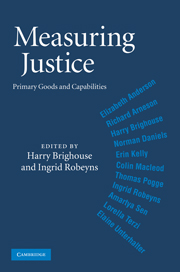11 - The place of capability in a theory of justice
Published online by Cambridge University Press: 05 June 2012
Summary
WHAT WE OWE TO RAWLS
As I read this extremely interesting collection of papers on measuring justice, and more specifically on the relative merits of the capability perspective and Rawls's use of primary goods, my sense of admiration for the essay is supplemented by a definite sense of being lowered into a pit to fight John Rawls – no less. If I am more than a little uncomfortable to play this role, this is not because my disagreements with Rawls are slight or trivial. In fact, my differences with Rawls extend well beyond the rather limited confines of the competing claims of primary goods and capabilities, with which this particular book is concerned.
Rather, my discomfort arises from the fact that I have learned more about political philosophy from Rawls than from anyone else. It also comes from my conviction that but for the profound impact that Rawls had on my thinking I would not be so engaged in political philosophy at all. If that impact and the understanding that it generated have taken me, ultimately, away from some particular features of Rawls's own theory of justice, that departure is far less important to me than what I have learned from Rawls. This includes, incidentally, what Rawls has taught me about how I should go about determining whether I agreed with him or not.
Keywords
- Type
- Chapter
- Information
- Measuring JusticePrimary Goods and Capabilities, pp. 239 - 253Publisher: Cambridge University PressPrint publication year: 2010
References
- 21
- Cited by

